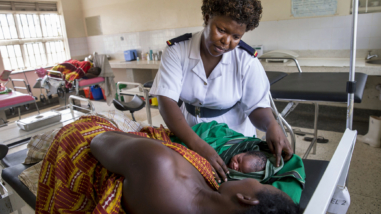Organizations working to increase government transparency, citizen participation, and public sector accountability know they have a lot to learn – and a lot to share with others. They have an appetite for inquiry and reflection that pushes us all to be smarter and more effective. We’re trying to make the most of this intellectual energy within a new substrategy that will shape how our grant dollars can support exploration, experimentation, and exchange. My colleague Alfonsina Peñaloza is leading the approach here, and we hope you will share your ideas and input with us in the weeks ahead.
The organizations working in this area are tackling extraordinarily complex challenges, using frameworks and approaches that don’t yet have much of a track record. They’re variously trying to reduce corrupt behavior by public officials; improve government procurement and taxation practices; increase the ability of civil society organizations to look at government budgets and know what the numbers mean; encourage citizens to seek information that helps them understand whether governments are fulfilling their commitments and provide feedback if their needs are not being met. And that is by no means a comprehensive list of aims. Practitioners convene, co-create, build apps, establish partnerships with the media, train paralegals, organize hack-a-thons, develop infographics, and much, much more.
Perhaps because so much of this work is done by people who have a lifelong commitment to the virtues of “openness,” we find (and experience) an appetite for new ideas, a willingness to try (and potentially fail), and an eagerness to share lessons with others. A huge opportunity exists for systematic, well-resourced learning activities to help the field find out what strategic and tactical approaches are most likely to succeed, why, and how best to promote public sector transparency and improve the chances that governments will respond to citizen demands.
Within our relatively new transparency, participation and accountability strategy, we are seeking to contribute to learning in the field in three ways:
- We are looking for partnerships with organizations that are committed to learning and to sharing with others. We often are able to provide flexible resources for grantees’ work, with the understanding that they will be able to engage in a virtuous cycle of trying out an idea, seeing whether it works, changing what they need to change, and letting others know what and how they’re doing. We’re seeking to come as close as possible to adhering to recommendations in the 2015 report, “Supporting Learning? Exploring the Relationship between Grantee Learning and Grantmaker Practice in the Transparency and Accountability Sector.”
- We are building a portfolio of grantmaking to advance the field’s understanding of three questions that are important to all the other work we support. These are described in the consultation draft for our learning substrategy, and are:
- How do TPA policies and interventions affect women and men differently (e.g., access to information laws, participatory budgeting processes, etc.)?
- How is data created, collected, and made available through transparency initiatives (including citizen-generated data) and used to improve service delivery?
- What factors help citizens and civil society organizations work with government officials to improve service delivery?
- In making grants to generate knowledge around these questions, we will promote knowledge production and learning from the Global South and hear from voices that have been historically marginalized, particularly women and scholars who work in languages other than English. We aim to shrink the gap between academics and practitioners, particularly taking into consideration the importance of grassroots learning from the Global South. And we will aim to support evaluations that are demand-driven or that include a practical, practitioner-focus to their results.
- 3. We’re focused on learning about our grantmaking approach, too. We have hired the consulting firm ITAD to design and implement an evaluation process that will review our strategy for amplifying citizen voices through transparency, participation, and accountability. They will follow our approach for several years. ITAD will dig into a set of questions each year, bringing us as a team together to reflect on what they’re finding from grantees and others, so that we can adjust our thinking and grantmaking as we go. Beyond this, we frequently create opportunities to delve into some new literature in the field and/or feedback from those closest to the action, compare the emerging knowledge with what our grantees are doing, and encourage each other to use what we’re learning for the next set of funding decisions. As just one example, we recently tackled the question of whether and how work that is explicitly about fighting corruption enters into our strategy. In the process, we sorted out among ourselves concepts around different types of corruption, and the relationship between corrupt practices and problems with service delivery; and we looked closely at what different organizations we support are doing to call attention to, combat, and/or mitigate the negative effects of endemic corruption in Mexico, and East and West Africa.
We’re hoping that through this intensified and intentional approach to learning in our grantmaking and in our daily lives, we will make the most of the openness in the field of transparency, participation, and accountability – in a way that helps advocates and decision-makers use it to improve the quality of public services for everyone, especially poor women.
We hope you will take a moment to read our learning substrategy (also available in French and Spanish) and send any comments to your program officer or to communications@hewlett.org.

 fotosipsak/GettyImages
fotosipsak/GettyImages

